Contributory members are able to log private notes and comments about each site
Sites Anne T has logged. View this log as a table or view the most recent logs from everyone
Lemmington Wood
Trip No.1 Entry No.1 Date Added: 14th May 2016
Site Type: Rock Art
Country: England (Northumberland)
Visited: Yes on 8th May 2016. My rating: Condition 3 Ambience 4 Access 4
Lemmington Wood submitted by SolarMegalith on 28th Feb 2013. Cup-and-ring marks in artificial lighting (photo taken on February 2013).
(View photo, vote or add a comment)
Log Text: Lemmington Wood Rock Art/Rune Stone, Northumberland: We'd been told about this rock by a member of the Tynedale North of the Wall Archaeology Group who is renowned for visiting many and various rock art sites in Northumberland.
From the A1 North, we turned up on the A697 and drove the almost 16 miles to Edlingham (not to be confused with the nearby village of Eglingham to the north). We arrived in this quiet spot to the sound of a cuckoo in the fields nearby – a sound rarely heard up here these days. Just north of Corby’s Crags, an impressive settlement and rock shelter to the right hand side of the road, there is a turn to the left leading to Lemmington Hall. Just as this side road turns off, there is a small parking area and a memorial bench which looks out over to Edlingham Burn and the Aln Valley.
Whilst these are marked as private woods, there are three trails leading from the entrance gate to the wood. Various signposts say “No Bikes” but doesn’t discourage walkers. The ERA record (see below) says there is open access to this stone. These woods have obviously been decimated by the storms over Christmas and New Year and there are fallen trunks and branches everywhere. The trunks blocking the pathways have largely been chain-sawed to allow access.
A GPS is really needed to find this rock, which sits on the top of a slope, which, if the trees hadn’t been there, would have given great views over the valley beyond. The rock is really hidden in a dip and surrounded by conifers so is difficult to spot.
Someone had been there recently and scrapped off the moss in order to see the rock art and runes more clearly. This was good for us, but not so great for the preservation of these features.
According to the HER records (HER 4471), the runes were only found in 1991 by Ian and Irene Hewitt as they prepared the rock for wax rubbing and photography. The runes and rock art are on the edge and upper face of a 6ft outcrop. Described on the England’s Rock Art site ERA 579.
There is clear evidence on the stone of attempts to quarry it, so what else might have been on a more complete rock?
Jenny's Lantern
Trip No.1 Entry No.2 Date Added: 14th May 2016
Site Type: Hillfort
Country: England (Northumberland)
Visited: Yes on 8th May 2016. My rating: Condition 3 Ambience 4 Access 3
Jenny's Lantern submitted by SolarMegalith on 5th May 2013. Rampart and ditch in the southern part of Jenny's Lantern Iron Age hillfort (photo taken on May 2013).
(View photo, vote or add a comment)
Log Text: From the Lemmington Wood rock art/rune stone, we carried along on the minor roads headings towards the tiny village of Bolton, having gone through the somewhat exciting ford over the River Aln between Abberwick and Bolton Mills, then carried on past Jenny's Lantern Hill to Jenny's Lantern. Despite not having rained for a while, this ford was a lot deeper than it looked!
This site was one of the first we visited at the time we (I) signed up for the Portal. Having tried to find the Midstead Rock Art stones without a GPS, but with many stony outcrops on the hill, we failed, meaning to go back but haven’t until now.
Just east of this hillfort is also a Romano-British settlement, which also includes the remains of an Iron Age defended settlement, with a number of visible hut circles, recorded as HER 4379. The whole site is complex and even with the HER and Historic England records, it is quite difficult to unpick on the ground.
The outer banks and ditches are well preserved. From the road, it’s not easy to see the oval fort at all. There is room for a small car in the gateway to a field to the south, at grid reference NU 12433 15229, overlooking the observatory/listening station at Cloudy Crags to the south east. From the gate in the field opposite, follow the track up the hill then head west almost the field, boundary. On the way to the hillfort you will cross the low banks and ditches of a separate Romano-British settlement. Crossing a stone bank, you will see the eastern outer banks and ditches of the hillfort rising up against the skyline.
The actual Jenny’ Lantern, recorded as HER record 20729 (probably an 18th century’ eye-catcher’ folly) stands north east at the brow of the hill.
The hill fort and settlement sit below the brow of the hill, but there are superb views across to the Aln Valley to the south and west. I'd feel safe living here if I lived in days gone by.
Midstead 2
Trip No.1 Entry No.3 Date Added: 14th May 2016
Site Type: Rock Art
Country: England (Northumberland)
Visited: Yes on 8th May 2016. My rating: Condition 3 Ambience 4 Access 3
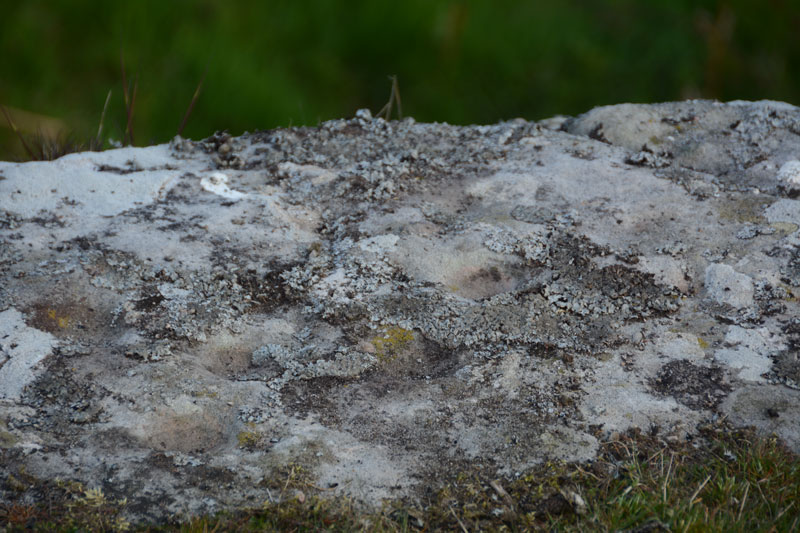
Midstead 2 submitted by Anne T on 11th May 2016. Close up of some of the cup marks on this rock. The ERA-599 record for this stone says there are 35 possible cup marks, but we didn't spot that many. I would have liked to have tried a rubbing of this rock to see how many there were.
(View photo, vote or add a comment)
Log Text: Midstead 2, Rock Art near Edlingham, Northumberland: Having visited Jenny's Lantern Hill Fort and Settlement, we headed back east with the GPS to find the rock art stones we'd failed to find on our visit back in 2014 (our first trip out to find rock art, without a GPS). This rock sits right on the edge of the crag with great views over the Aln Valley below. The cup marks are a little difficult to spot until your eyes adjust to the lumps and bumps on the rock. The cups are inter-disbursed with natural hollows. There are some cup marks on the vertical face of the rock although it was difficult to get too close because of the 'killer' brambles. Note to self: take garden shears/machete on next visit!
Midstead 3
Trip No.1 Entry No.4 Date Added: 14th May 2016
Site Type: Rock Art
Country: England (Northumberland)
Visited: Yes on 8th May 2016. My rating: Condition 3 Ambience 4 Access 3
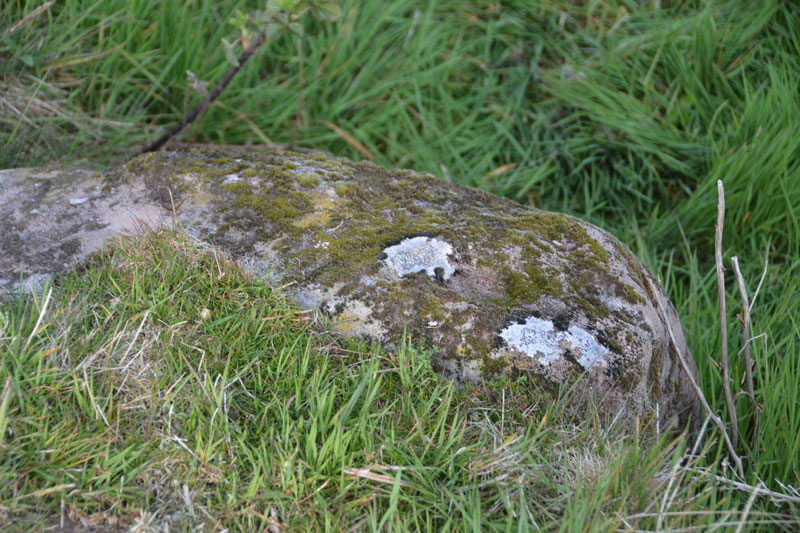
Midstead 3 submitted by Anne T on 11th May 2016. Midstead 3 showing some more of the cups on the far side of this boulder. When the NADRAP survey was done they uncovered parts of the stone buried under turf, so they were able to see all 13 cup marks.
(View photo, vote or add a comment)
Log Text: Midstead 3, Rock Art near Edlingham, Northumberland: Also see visit report for Jenny's Lantern Hill Fort and Settlement, Midstead 1 and Midstead 2. This stone is about 3 metres to the west of Midstead 2, although the cups are more difficult to spot. Beautiful views over the Aln Valley and to the listening/radar station at Cloudy Crags across the valley.
Midstead 1
Trip No.1 Entry No.5 Date Added: 14th May 2016
Site Type: Rock Art
Country: England (Northumberland)
Visited: Yes on 8th May 2016. My rating: Condition 3 Ambience 4 Access 4
Midstead 1 submitted by SolarMegalith on 11th May 2013. Cup-and-ring mark with a gutter in the NE corner of Midstead 1 panel (photo taken on May 2013).
(View photo, vote or add a comment)
Log Text: After visiting Jenny's Lantern Hill fort and settlement and Midstead 2 and 3 to the west, we walked eastwards along the top of the crag to find the rock art we'd failed to find on our first trip in 2014. Thank goodness for GPS otherwise we never would have found these. The ground in this rocky field had obviously been very wet at some time in the recent past and been home to some large cattle. Not having rained for some time the ground had hardened, making walking over the tussocks difficult. This stone is the most impressive on the hillside with numerous motifs. Well worth seeing. I'm glad we returned. About 3 metres to the south west of this stone we found another with a cup mark at grid reference NU 12424 15448. Having been sent the HER records for Jenny's Lantern, the Historic England map for this entry (1008839) shows a homestead just above the site of this stone - not marked on the OS maps and not clear on the ground (although not being aware it was there we didn't hunt around).
Thimbleby Nine Stones
Trip No.2 Entry No.1 Date Added: 9th Oct 2019
Site Type: Standing Stones
Country: England (Yorkshire (North))
Visited: Yes on 9th Jun 2016. My rating: Condition 3 Ambience 4 Access 3
Thimbleby Nine Stones submitted by SolarMegalith on 15th Mar 2013. Northern pair of standing stones - view from the south (photo taken on March 2013).
(View photo, vote or add a comment)
Log Text: Nine Stones Stone Row, near Osmotherley, North Yorkshire: Having added a few of the Stone Rows of Great Britain sites on the Portal, and needing to go down to Thirsk it was too much of a temptation to resist visiting one or two of the North Yorkshire sites. With only a 3 hour window before having to travel onto Doncaster, the only one we could reach and explore in time was Nine Stones, just outside Osmotherley.
We’ve been to this area before to look at Anglo Saxon crosses in churches and ended up getting hopelessly lost, but this time we had the OS map and our GPS. With the sun shining down from an almost cloudless sky, we reached the car park at Square Corner easily enough. It never ceases to amaze me that there are so many more people in this part of the world than in Northumberland. There were people picnicking on the side of the road near Solomon's Temple enjoying a wonderful view over Oak Dale valley and the woods of Crabtree Bank and Thimbleby Bank Plantations.
As we pulled up, a number of dog walkers drew up, chattering noisily, and I hoped they weren’t going to follow us and destroy the peace and quiet of the afternoon (I’m definitely getting to be a grumpy old woman!). Fortunately, they followed the Cleveland Way up the hill to the south.
From the car park, we walked the couple of hundred metres to the gate where the footpath west over Thimbleby Moor and the Cleveland Way southwards meet. The GPS told us there was almost 700 metres to walk to Nine Stones, so we set off over the stile over the wall by a second gate to the west. The first couple of hundred yards were easy walking along a stoned footpath leading off to some modern shooting butts to the west. After 200 metres we needed to veer off southwards to follow the dry stone wall westwards. This was all through knee deep heather with the occasional field drain and boggy patch thrown in. After another 200 yards we realised we’d reached a much quarried area; there were deep holes full of water which we could only see when we were almost upon them. I managed to disappear up to my ankles in one, although there were other that looked far deeper.
Whilst the area has many blocks of stone poking up through the heather, towards the top of the slope there suddenly appeared on the horizon two standing stones, looming large, beckoning the walker. Here was (were?) Nine Stones, at last.
This stone row was well worth the trudge through the undergrowth. At the northern tip of the row there are five stones, two tall, two stumpy and one almost buried in the heather. We wondered which were actually part of the stone row. The north-western most stone looked as if there had been an attempt to quarry the top of it in the distant past (comparing the holes to some at Edges Green, near Cawfields) that we’ve seen recently.
Two more tall stones sit close to the stone wall, and a few more stones appear further south in the forested area. The Stone Rows of Great Britain site tell us that this stone row is 60 metres long, but husband, tramping through the forest, thought it might be possible that the row was nearer to 100 metres (but then which are natural stones and which are recumbent standing stones?).
There are so many other features in this area to explore: Miley Pike Tumulus, Robinson’s Cross (remains of), a Holy Well, Faber’s Stone – well worth a repeat visit.
Clifton Stones
Trip No.3 Entry No.2 Date Added: 4th Jul 2016
Site Type: Standing Stones
Country: England (Cumbria)
Visited: Yes on 3rd Jul 2016. My rating: Condition 3 Ambience 4 Access 3
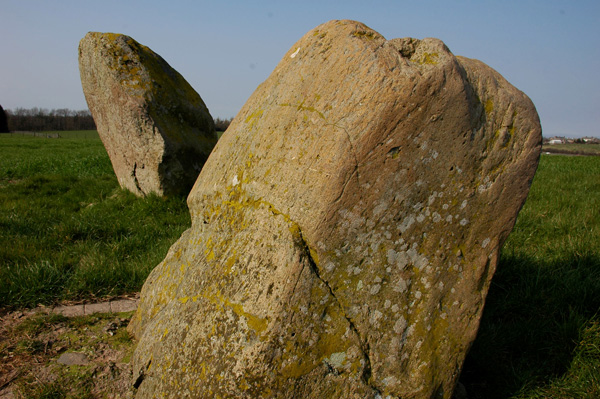
Clifton Stones submitted by nicoladidsbury on 31st Mar 2007. Clifton Standing stones - the smaller stone is set in concrete. Plough marks are visible on its southern side. Buzzards were flying overhead, fantastic :)
(View photo, vote or add a comment)
Log Text: Clifton Stones, near Penrith, Cumbria: These standing stones are only a short distance from Trainford Brow Long Barrow. There is a side road opposite Mount Clifton farm which allows for parking of one car on the grass verge. It was interesting crossing the A6 as cars sped along in both directions; however, sight lines were good. We followed the footpath through Mount Clifton farm (heavily mired with fresh cow dung). This path was gated, as they had a huge (but placid) bull in the barn yard with his ladies. The mire gave onto a tarmacked pathway leading to Tinkler’s Lane Bridge over the M6. It was then easy walking down to the field containing these two standing stones.
With a brilliant view of the North Pennines to the east and the Lake District (complete with notch in the hills) to the west, these stones sit next to the very busy M6 with a view of Penrith to the north. Because of the acoustics on the day, the traffic noise was a distant buzz in the background.
I was a little disappointed as the smaller stone had obviously fallen over in the past and been cemented into the ground.
After enjoying the ambience for a while, we tried to see the Cairn Circle at Leacet Plantation. The first forest track we tried had a Lowther Forestry working locking the gate. We then tried at Chatburn Kennels and Cattery, but the fields were cropped and walking through them heavy going. Being late in the day we decided to retreat to go and see the Countess Pillar then home. We got beeped at by the owners of the kennels who had come down to dump their rubbish exactly where we had parked the car.
Burnswark Hillfort
Trip No.4 Entry No.1 Date Added: 7th Aug 2016
Site Type: Hillfort
Country: Scotland (Dumfries and Galloway)
Visited: Yes on 31st Jul 2016. My rating: Condition 3 Ambience 5 Access 4
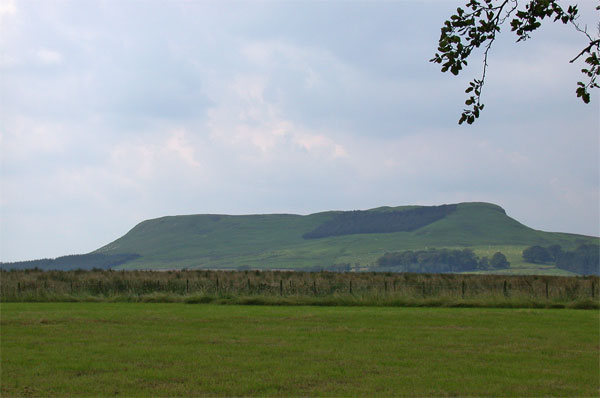
Burnswark Hillfort submitted by nicoladidsbury on 21st Mar 2005. Burnswark Ancient Hillfort
(View photo, vote or add a comment)
Log Text: Burnswark Hill Fort, Dumfries & Galloway: A week of being stuck in the house contemplating on, and preparing for, the building work to come I was glad to escape the house for a walk in open countryside with few people around. Considering we’ve lived in this area for 10 years, we never visited this impressive and enigmatic hill fort. It was as good as (if not better than) Edlingham Castle, and in my view, more interesting. There was such a lot to see. Exiting the A74(M) at Ecclefechan, we headed off up the narrow one track rock up past farms called ‘Paulsland’ and ‘Relief’. There is a small parking area just before the gate to Burnwark Farm at grid reference NY 18788 78332. We then plunged into the darkness through a track through the forest, to emerge onto a grassy hillside filled with large sheep. It was strange and nice to make the transition from English ‘stick to the footpaths’ to the Scottish ‘responsible right to roam’; different rules for only a few miles apart.
From the forest track, a trackway follows the hillside upwards to the hillfort. The first things to come into views were ‘the three bretheren’, which we took to be burial mounds surrounded by ditches, although the Canmore record below describes them as possible Roman artillery positions for attacking the fort.
On top of the plateau, there were huge views around 360 degrees, including the sun shining off the Solway Firth. Neither Andrew or I have ever been at a point where it’s been possible to see both Criffel and the Lake District (Helvelyn was the tallest peak) at the same time. There are also the grassed over remains of structures, although I found it impossible to interpret what they were.
Having walked over to the north-western side of the fort to see the Roman fortifications below, we made our way over to the nearby cairn on the next hilltop.
Burnswark Hill Cairn
Trip No.4 Entry No.2 Date Added: 7th Aug 2016
Site Type: Cairn
Country: Scotland (Dumfries and Galloway)
Visited: Yes on 31st Jul 2016. My rating: Condition 3 Ambience 4 Access 3
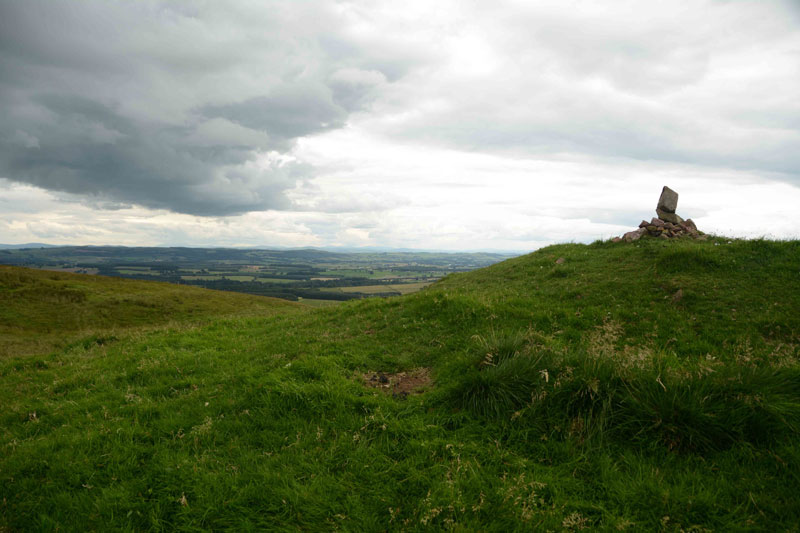
Burnswark Hill Cairn submitted by Anne T on 7th Aug 2016. The Cairn at Burnwark Hill as seen from the path from the hillfort.
(View photo, vote or add a comment)
Log Text: Cairn at Burnswark Hill, near Ecclefechan: After walking around the hill fort, we spotted this cairn on the next hill top to the north east and followed the tracks over. There were great views down to the Roman fortifications on the north western side of the fort. Whilst Romans usually leave me cold, the juxtaposition between the hillfort, the fortifications and the cairn, together with the views of the Solway Firth, Criffel and Helvelyn in the Lake District beyond, were stunning. A great afternoon, and well worth the visit.
Whiteholme Rig
Trip No.4 Entry No.3 Date Added: 7th Aug 2016
Site Type: Stone Circle
Country: Scotland (Dumfries and Galloway)
Visited: Yes on 31st Jul 2016. My rating: Condition 2 Ambience 2 Access 3

Whiteholme Rig submitted by Anne T on 7th Aug 2016. The first stone in this ancient monument that we saw from the edge of the adjacent field. The farmer hadn't made it easy for visitors to reach this stone circle, and it was a real shame the ground had been left to go wild, which made it difficult to make out any monument at all.
(View photo, vote or add a comment)
Log Text: Seven Brethren Stone Circle, near Lockerbie: I was surprised to find this was so near where we used to live at Corrie. But when we lived here, with three young children, we didn't have the same interests as we do now, so (although the kids say we traumatised them by taking them to so many monuments) we never visited. We parked by the gate to the disused quarry near Standburn farm, hopped over the gate and followed the track up to Whiteholm Rigg. At present, along the top of this low ridge, a row of trees follows the trackway. Right at the end, motorway barriers have been erected to form a large, robust enclosure, gated at both ends, which looks as if it's used as a stock enclosure. Beyond the gate at the eastern end, cows and their calves grazed in the lush grass on the hillside below. Walking along the edge of the field, small toppled stones could be seen in the grass, which had been left to grow long and untended around the stones, but mown in the area beyond. Walking around the tussocks we spotted the remains of 6 stones, but how unimpressive this site is. If we hadn't have known that this was a stone circle, we would have thought these were just a few outcrops in the grass. Such a shame.
A funny (now) moment occurred at the end of our visit. Going back to clamber over the gates into the enclosure, the bulls in the field (of which there were several, excitable!) came to investigate. One stood pawing the ground with its front hoof. Husband climbed the 8 ft tall motorway barrier, which left me stuck in the stone circle field. However, husband managed to distract the cattle whilst I climbed over two gates to get back to safety!
Dyke Row
Trip No.5 Entry No.1 Date Added: 14th Aug 2016
Site Type: Stone Row / Alignment
Country: Scotland (Dumfries and Galloway)
Visited: Yes on 10th Aug 2016. My rating: Condition 3 Ambience 1 Access 4
Dyke Row submitted by cosmic on 4th Jun 2004. Dyke Row at NT084036 is just to the south of Moffat
(View photo, vote or add a comment)
Log Text: Dyke Row or Three Stanes, Moffat: I have driven this road many times before, but never noticed these three stones at the side of the road. Having come off the A74(M) onto the A701 travelling towards Moffat, travelling at the speed limit of 60 mph, they are difficult to see. The traffic was too heavy and fast to park at the road side, so finding a space for one car at the road junction to Dyke Farm (grid reference NT 08311 03653) we pulled on our anoraks and headed northwards up the A701. Whilst I’ve been to see many standing stones, this is the first time I felt my life was in danger whilst trying to view them. Timber lorries hurtled along the road in the heavy rain in quick succession. To avoid the spray and protect my camera, I had to turn my back to the road and step onto the grass verge as far away from the road as I could go. A quick run across the road to the stones meant taking my life in my hands to avoid the constant stream of cars, lorries and trucks.
The smallest, northern-most stone was completely hidden by the undergrowth, but we gently bent this out of the way to photograph it, then replaced the shrubbery and nettles back over the stones.
According to the Canmore record: "These standing stones are on a straight alignment NNE - SSW. The southernmost measures 1.0m x 0.8m x 1.2m high, is oriented ENE - WSW, and has an O S bench mark cut on its W face. The next measures 0.8m x 0.6m x 1.0m high, and is oriented NNE - SSW. The most northerly measures 0.8m x 0.4m x 0.7m high and is oriented ENE - WSW. The construction of the nearby roads would have destroyed any possible related structures."
Menzion
Trip No.5 Entry No.2 Date Added: 14th Aug 2016
Site Type: Standing Stones
Country: Scotland (Scottish Borders)
Visited: Yes on 10th Aug 2016. My rating: Condition 2 Ambience 3 Access 5
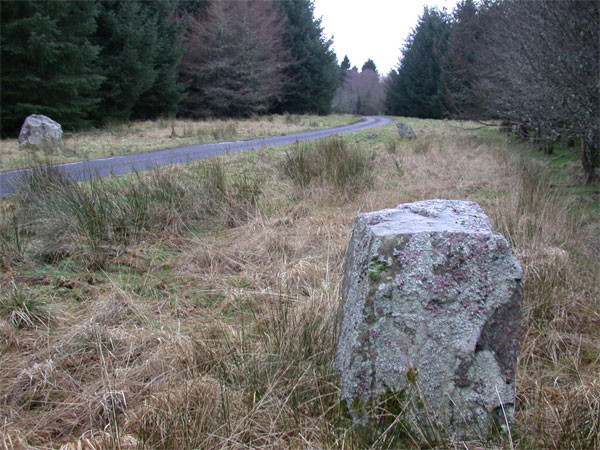
Menzion submitted by nicoladidsbury on 28th Jan 2005. This photo tries to capture the group of three stones, that make up the Menzion site.
This is a beautifully, quiet place. The stones are not very big, less than a metre high, but remarkable because they are absolutely covered in lichens, as are the branches of the over hanging trees. A sure sign of the purity of the air.
(View photo, vote or add a comment)
Log Text: Menzion Stones, Tweedsmuir: I confess to being really confused about this site (not too difficult, really!). Whilst the map showed three standing stones in close proximity at the sides of the road (2 at the western side, 1 on the eastern side) we could only find 2, one on either side of the road. Of the photos on the Portal, we couldn’t find the square topped one. Somehow we’d managed to misplace our GPS, so I felt a bit helpless and frustrated at having driven all this way and missed some of what we’d come to see.
According to the Canmore site, the grid references are NT 0952 2397, NT 0949 2398, NT 0953 2399. Getting out of the car into the ‘Scotch Mist’, I walked up and down the grass verges, peering into the tall undergrowth, for a couple of hundred yards trying to find the location of the third stone. We saw the stones at NT 0952 2397 and NT 0949 2398. The latter was almost hidden by a long, low conifer branch.
Had the sun been out, there would have been great views down to the River Tween to the north-west.
Altar Stone, Stobo
Trip No.5 Entry No.4 Date Added: 14th Aug 2016
Site Type: Standing Stone (Menhir)
Country: Scotland (Scottish Borders)
Visited: Yes on 10th Aug 2016. My rating: Condition 2 Ambience 3 Access 5
Altar Stone, Stobo submitted by austenjohnreid on 5th May 2010. Site in Scottish Borders Scotland
(View photo, vote or add a comment)
Log Text: Altar Stone, near Stobo, Scottish Borders: This stone is clearly marked on the map and features on the Portal, but I can find out nothing about it on Canmore or other web sites.
From Tinnis Castle, driving up the B712 through Drumelzier and Drumelzier Haugh, just past Dawyck Botanic Garden, a small road turns sharp left up through a hamlet called ‘Altarstone’. Opposite the farmhouse, hidden beneath tree branches at the edge of the road is the altar stone Intriguing Need to find out more about this.
Dreva Craig
Trip No.5 Entry No.5 Date Added: 18th Aug 2016
Site Type: Standing Stone (Menhir)
Country: Scotland (Scottish Borders)
Visited: Yes on 10th Aug 2016. My rating: Condition 2 Ambience 4 Access 4
Dreva Craig submitted by austenjohnreid on 29th Apr 2010.
the east side of the hill is littered with boulders & longstones, there is also some remains of a stone age stuff too much to photograph.
(View photo, vote or add a comment)
Log Text: Dreva Craig, hillfort and settlements, Scottish borders: OK, so it rained last year on my birthday. This year, the rain was equally as torrential, so we hopped from site to site. This was our last stop of the day, after (trying to visit) Tinnis Castle/Hillfort and Altarstone. There is a parking space for one or two cars next to the gate to the field, and a stile over the fence, although it proved easier to open the gate. Tramping through the knee high undergrowth, it was easy to reach the rocky outcrop on the ridge leading to the fort itself, but the surface of the rock was so wet it was quite treacherous. Husband would have been happy to continue, but I wimped out when I spotted the huge bull 50 yards away, opting to take a few photographs and retreat to the warmth (and safety) of the car. We plan to come back to this area when the weather is drier. This really looks like a fascinating site, with lumps and bumps on both sides of this minor road. The Canmore record tells me that there is a fort (photographed), defended by two stone walls, alongside three settlements. Had the sun been out, there would have been really fantastic views down to the River Tweed to the south.
St. Helen's Well (Newbiggin-on-Lune)
Trip No.6 Entry No.2 Date Added: 14th Feb 2017
Site Type: Holy Well or Sacred Spring
Country: England (Cumbria)
Visited: Yes on 11th Sep 2016. My rating: Condition 2 Ambience 3 Access 5
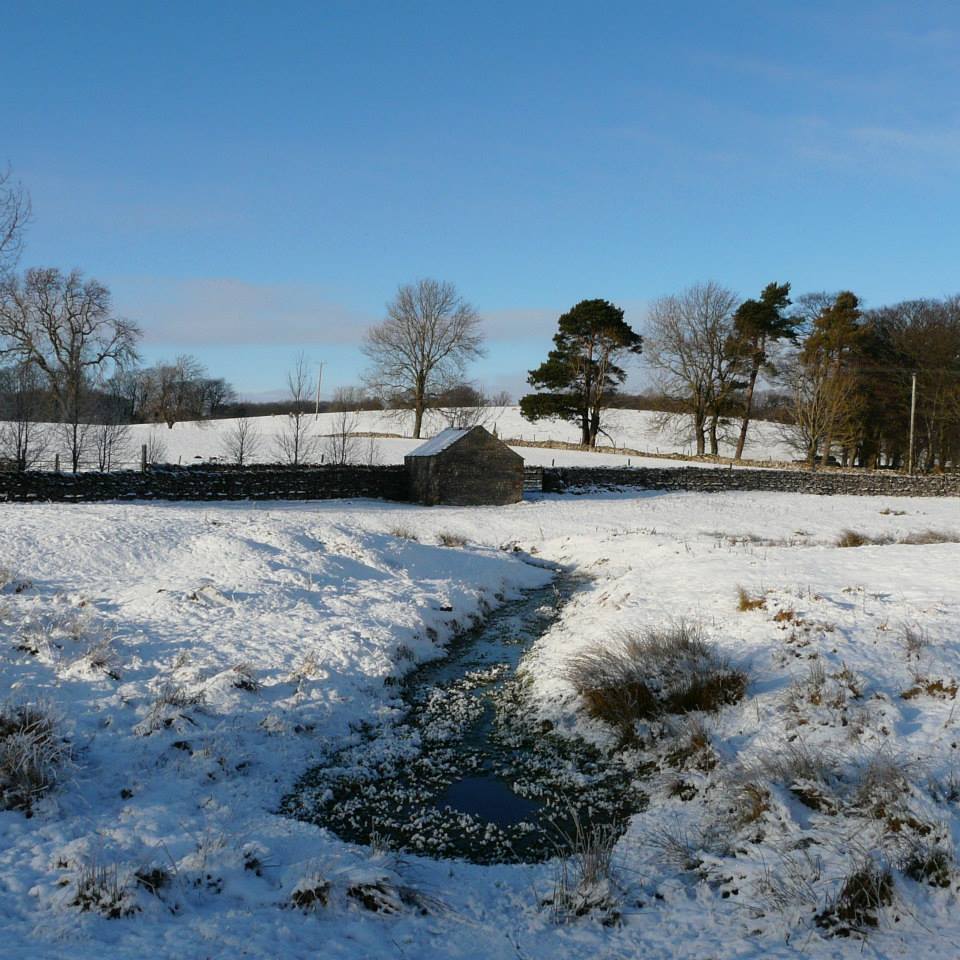
St. Helen's Well (Newbiggin-on-Lune) submitted by HeronEye on 2nd Mar 2014. St Helen's Well, Newbiggin on Lune.
The source of the River Lune.
This well pool is situated next to the mound of chapel that once stood here (picture left).
(View photo, vote or add a comment)
Log Text: St Helen's Well, Newbeggin-on-Lune, Cumbria: After seeing the Loki Stone at Kirby Steven, we followed the A685 south and west to Newbeggin-on-lune. St Helen’s Well is about 50 metres to the north of the A685 (called Fell Lane at this point). It sits almost at the junction where Chapel Butt Lane splits into two. There is parking for about three cars at this junction.
We initially took the left hand fork, walking down to where a footpath sign pointed right over the field containing the well, just before a field gate. Climbing the small stile, walking over the footbridge, we were confused as to where the well was. We understood this well was supposed to be the source of the River Lune, but there are small streams which run to the north/north east which carried a strong flow of water (there must have been a large amount of rain here recently, as the ground was incredibly boggy with large puddles across the paths, as opposed to being dry where we live). Wading through the puddles through the field gate, there was a large boggy area (complete with bull) which appeared to be the lowest point in the area, and the source of the water flow.
Retracing our steps, we asked a local lady who was walking her dog. Despite having visited this area for 34 years, she hadn’t heard of this well. Walking down the right hand lane, the well can be found by walking down the right hand side of Chapel Butt Lane (heading towards Friar Bottom Lane), with the pool becoming visible just after the first bend.
St Helen's Well (Great Asby)
Trip No.6 Entry No.3 Date Added: 2nd Oct 2016
Site Type: Holy Well or Sacred Spring
Country: England (Cumbria)
Visited: Yes on 11th Sep 2016. My rating: Condition 3 Ambience 4 Access 5

St Helen's Well (Great Asby) submitted by MisterBus on 12th Oct 2010. The beautifully restored well in the centre of the village is in full flow. The well was restored by villagers in 2008.
(View photo, vote or add a comment)
Log Text: St Helen's Well, Great Asby, Cumbria: This was our third stop of the day. From (confusingly) St Helen’s Well at Newbeggin-on-Lune, we took a right hand turn back onto the A685 then the next turn right taking the minor road between Crosby Garrett Fell and Ravenstone Moor. Turning right at the T-junction at Middle Bank, we followed the road through Little Asby to Great Asby. We parked next to the little alms cottage about 20 metres to the north west of this well. At first, all I could see was a modern stone wall with some horribly concrete shapes on it’s top, with the Asby Beck beyond. Walking towards the modern stone wall, a huge rush of water could be seen running into the beck, coming from no apart source—just straight out of the ground.
The well itself has a square pool into which water emerges. As we watched, the flow of water was sufficient to move the sand forming the base. Most intriguing.
With a village this old, we decided to investigate the local church, St. Peter’s. The modern building is of no great age, although the ‘short account’ of the church says that the site may have been used from the 7th century onwards (as Peter was a common dedication from this time on).
The Pastscape record for this well says this well "was formerly seated round and of great repute for the medicinal properties of its waters. Consists of a deep pool, approximately 4.0m square, contained by a stone wall, with a drain-off channel at its eastern corner. It is not apparent whether the pool is fed by a natural spring or a piped supply, as the point of issue is below water level. A modern wall partially surrounds the well. "
Hollin Stump Cairn
Trip No.6 Entry No.4 Date Added: 2nd Oct 2016
Site Type: Cairn
Country: England (Cumbria)
Visited: Yes on 11th Sep 2016. My rating: Condition 3 Ambience 4 Access 3
Hollin Stump Cairn submitted by HeronEye on 14th Mar 2014. Looking East to Hollin Stump cairn from the footpath to Gaythorne Plain ring cairn.
(View photo, vote or add a comment)
Log Text: Hollin Stump Cairn, Gaythorp Plain, Cumbria: From St Helen's Well at Great Asby, we headed south south west, following the single track road to ASby Winderwath Common, were the metalled carriageway turned west across Gaythorne Plain. We parked by the cattle grid on opposite Linglow Hill, where a dog walker had taken up much of the dry parking area and was waiting for his 2 lively terriers to wear themselves out tearing across the grass.
We hadn’t spotted a gateway into the field containing Hollin Stump Cairn from the road, so followed the bridlepath south. There was a gate into the field about a quarter mile from the road, but there was a herd of large cows (and a bull) surrounding the cairn, so we only go to view this from a distance.
We carried along the bridlwway to find the Gaythorn Plain Ring Cairn/Stone Row (not sure we found it, need to process the photos). The latter was visit 7/5 (not yet logged).
Mauley Cross
Trip No.7 Entry No.1 Date Added: 2nd Oct 2016
Site Type: Ancient Cross
Country: England (Yorkshire (North))
Visited: Yes on 1st Oct 2016
Mauley Cross submitted by vagabondnma on 13th Mar 2007. Mauley Cross standing on a raised area of land by the forest road backed by a plantation.
(View photo, vote or add a comment)
Log Text: Mauley Cross, north of Stape, North Yorkshire: Chrispy's directions were spot on - thanks! Trust us to arrive on the day of a rally, with all the cars coming in the opposite direction. Being off-stage, they needed to stick to the speed limit and we found ourselves constantly pulling in to passing places. It was fun to see the different cars.
Arriving at the junction of the metalled road (Keys Beck Road) which runs north through Stape then up over the moors and the forest track (Brown Howe Road) we came across ‘road closed 1st October 2016 due to the Trackrod Rally). There were some marshalls sitting at the wide entrance to this forest track, so we parked between their cars and wandered 50 metres or so up the track to find this cross, making sure to avoid the rally cars which zoomed down every minute or so. After a few minutes a doctor's car zoomed up the track past us and we took advantage of a lull in the stream of cars (there must have been an accident - hope everyone was OK).
Sitting a couple of metres off the forest track, the grass around the cross has been cleared and a couple of tributes sit at its base.
There are two Mauley Crosses listed on the ADS database, the second being just east of Saltergate (this is a similar cross, made out of one piece of sandstone, forming a boundary marker between the parishes of Allerston and Lockton at grid reference SE86679493.
Old Wives' Well
Trip No.7 Entry No.2 Date Added: 2nd Oct 2016
Site Type: Holy Well or Sacred Spring
Country: England (Yorkshire (North))
Visited: Yes on 1st Oct 2016. My rating: Condition 3 Ambience 4 Access 5
Old Wives' Well submitted by vagabondnma on 13th Mar 2007. A close-up of the well. The inscription (grafitti?) on the capstone is not easily visible).
(View photo, vote or add a comment)
Log Text: Old Wives' Well, just south of Mauley Cross, near Stape, North Yorkshire: With this well only 223 metres south of the Mauley Cross, we decided to walk down the narrow metalled road ((Keys Beck Road) to the well. Again, Chrispy’s directions were spot on. This time, the rally cars were back, appearing every minute or so and we had to ensure we were visible to the drivers at all times (sometimes difficult with the bracken at the sides of the road being so high). Walking southwards back down towards Stape Village, reaching the first passing place on the left hand side of the road, a small track leads through the grass. About 20-30 metres into the wood we glimpsed a wooden rail which partially surrounds the well, then the well itself came into site.
With a simple stone built ‘hood’ over it, into which there is writing carved into the lintel, this is a very enigmatic spot. The well basin was full of water and a small tickle cut its way through the peat floor of the wood, heading south west down hill towards the road.
There were plenty of old ribbons and scarves (even a sock!) tied to the trees around the well.
According to the Pastscape Record for this monument, number 60532, the lettering on the lintel reads: "Nattie Fonten L M Natalis" (Roman governor of 3 provinces 120AD).
Rawcliffe Howe
Trip No.7 Entry No.3 Date Added: 2nd Oct 2016
Site Type: Cairn
Country: England (Yorkshire (North))
Visited: Yes on 1st Oct 2016. My rating: Condition 2 Ambience 2 Access 5
Rawcliffe Howe submitted by vagabondnma on 13th Mar 2007. Rawcliffe Howe as seen from the road - which allows you to see its profile. Unfortunately the embankment cuts right through it. So some of it is missing.
(View photo, vote or add a comment)
Log Text: Rawcliffe Howe, south of Stape Village, North Yorkshire: No entry exists for Rawcliffe Howe on the ADS, but does on Historic England. From Old Wives’ Well, driving southwards back down through the Village of Stape, we came to a four way cross-roads. Parking in a small layby just as we turned into Low Moor Road, where on the opposite side of the road a footpath runs through the wood leading to Rawcliffe Banks. I used the photographs from the mobile Portal site to help locate this.
This round barrow sits right on the edge of the road opposite the entrance to Low Moor Road and has clearly been cut through by the road. Trying to photograph it was very tricky as the rally cars were coming in groups thick and fast, and at one point I jumped further onto the verge to avoid a car that nearly missed the turning!
We managed to get photographs from various angles, although if I hadn’t known this was a site from the Portal would have missed it entirely.
